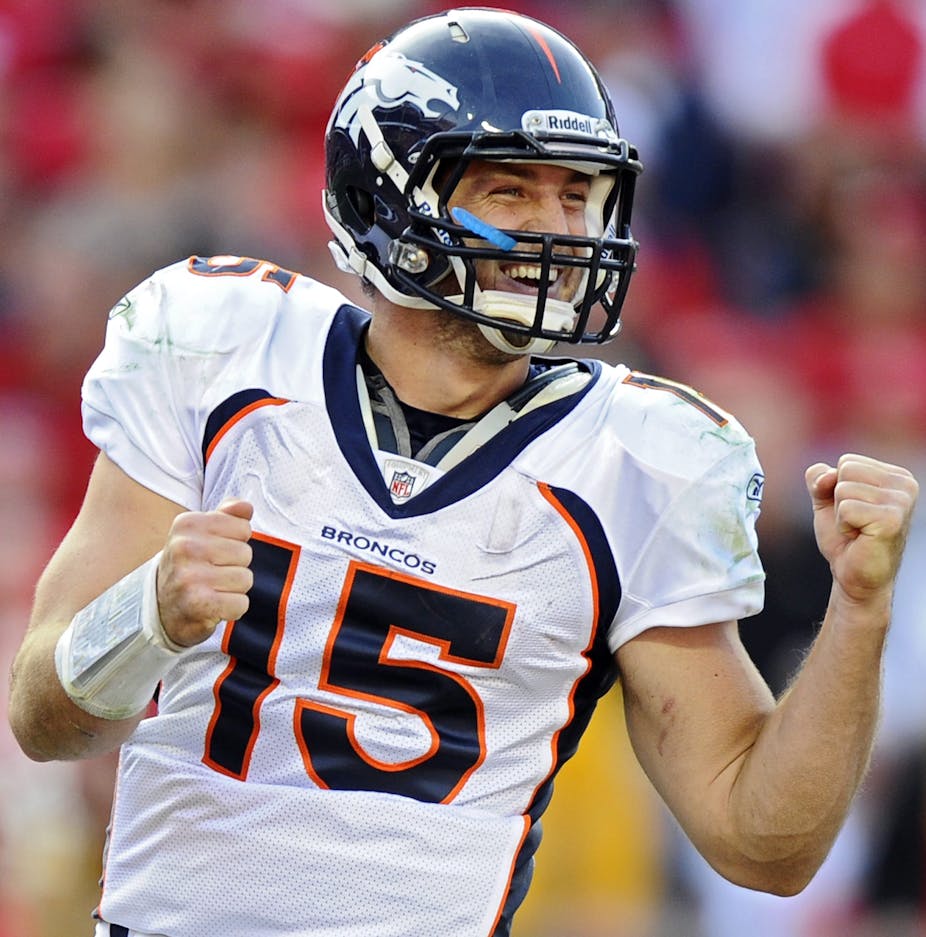Just as acquiring a perfunctory understanding of the AFL is inevitable in southern Australia, living in New England Patriots’ heartland has forced me to pay a little attention to America’s NFL.
Despite months of industrial disputes threatening the season, the 2011 American football season looks to be remembered for a good news story.
Good, in this context, having more to do with the proverbial Good Book than players patting puppies or playing with sick children.
Denver Broncos quarterback Tim Tebow has polarised American audiences with his on-field displays of religious fervour. Think singing psalms on the field, thanking God in press conferences, churchy tweets, out-and-proud virginity and an appearance in an anti-abortion commercial just as a taster.
Tebow’s penchant for the on-field stop-and-pray has even spawned a peculiar phenomenon known as Tebowing: a kind of planking, for Christians with cameras.
This public practice of faith has fans divided: on one side are those orgiastic about this young, handsome, very decent ball-player existing as a poster child for contemporary conviction. On the flipside are those thoroughly uncomfortable with the display, bandying around words like zealot and condemning the disproportionate attention Tebow received compared to others on his team and across the league.
I’m in the latter camp. Not about consolidated coverage – I don’t really care how much press attention Tebow gets; sport in general gets too much attention for my liking – but more so as related to my discomfort with the preachy stuff. To me it’s confronting and disconcerting and thoroughly distracting from the game.
I could effortlessly spin 500 words into defending my intolerance for the behaviour, outlining why my opposition is so dramatically different a bigotry to homophobia or islamophobia. Instead, I’ll admit to knowing that I’m on shaky ground, will happily acknowledge that my reaction isn’t politically correct and even identify that yes, it’s out of kilter with my liberal live-and-let live politics. Except as related to liberty, perhaps I might actually have a point.
An underlying premise of America’s much loved freedom of speech tenet is that a right may exist to voice an opinion but that no right exists to compel others to listen to it. It is here where I think I have some intellectual grounds for my discomfort. Tebow, by exploiting his captive audience of sports fans, is forcing his Christianity to be experienced by those of us who are simply not interested in it. Who may even be hostile towards it.
On a very cursory reading, Tebow could, of course, simply be interpreted as acknowledging his inspiration. In such a reading, one could contend his on-field praying is no different than wearing a head scarf, skullcap, pride flag or pentagram. Just as a homosexual may subtly out themself by mentioning a same sex partner, Tebow can be viewed as similarly and innocuously outing his Christian self.
Except Tebow isn’t just quietly wearing a crucifix or praying on Sunday with his family. Instead, he is stopping in the middle of a televised game to crouch down and pray and take advantage of an audience who just wants to watch a bit of sport; who can’t avoid their exposure to his practice of Christianity.
I acknowledge that had Tebow been engaged in behaviour related to things I actually champion, I might feel differently about my forced exposure. Of course, ever discovering this seems highly unlikely.
In a country where it’ll be a cold day in hell before a non-Christian is elected as President and in a country where corporations proudly refuse to advertise on a Muslim-themed television show, testing how I feel about non-Christian, non-heterosexual displays on the field appears unlikely to play out anytime soon.

